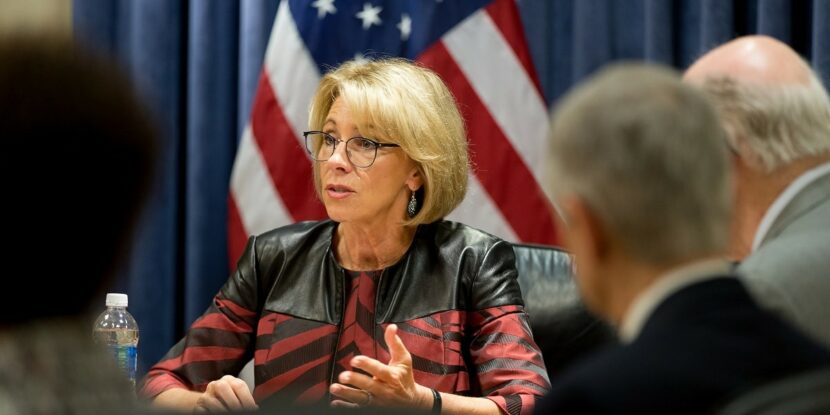This piece was co-authored by Emmett McGroarty, a senior fellow at the American Principles Project.
In her recent appearance before a House subcommittee, Secretary of Education Betsy DeVos again made the case for school choice (allowing some semblance of public funding for private education, whether through vouchers, tax credits, or other mechanisms). But the questioning she received from Democrats on the subcommittee illustrated the most serious danger of publicly funded school choice: that such programs open the door to government regulation of private schools.
Rep. Katherine Clark (D-Mass.) cited a private school in Indiana that supposedly said it may not accept voucher students “who are LGBT or who come from a family where there is ‘homosexual or bisexual activity.’” She asked DeVos whether, under a federal school-choice program, the federal government would prohibit the state of Indiana from allowing that school to participate in the program.
Although DeVos repeatedly defended states’ flexibility to make determinations about program participation, the salient point wasn’t her answer: It was the question. The mindset of Rep. Clark is exactly what defenders of private education must worry about with respect to school choice. When government money is used in any capacity in private schools — especially in a direct way such as a voucher or similar school-choice mechanism — it’s almost inevitable that government regulations will follow the money. Even the king of school choice, Milton Friedman, worried about this.
When the government begins to regulate the participating private schools, the schools will lose their independence and inevitably become more and more like the public schools that parents are trying to flee. Clark’s question illustrates one area of concern. Inevitably, a Christian school’s desire to adhere to biblical teachings about sex and marriage will be deemed “discriminatory” by the new government masters, and the school will be required to change its doctrine if it wants to keep the money flowing. During the recent legislative session in Georgia, for example, a bill was introduced to prohibit use of state-authorized scholarships at schools that “discriminate” in hiring or admission.
Religious doctrine is likely to be only one of the targets under a school-choice plan. Under the guise of “accountability,” government officials will certainly impose requirements on participating private schools so they can be judged according to criteria that are important to the government (though not necessarily to parents). For example, the Florida tax-credit program (which DeVos has praised) requires participating schools to be approved by the state, to employ teachers with certain qualifications, and to administer the state Common Core-aligned test or a national test and report the results to the state.
With a list this long, what difference would one more little requirement make? Perhaps the requirement that the private schools just go with the state test, not a different national test? After all, how can we compare school performance if the private schools aren’t giving the same assessments? “Accountability” demands no less. Indeed, it’s already true that private schools in Indiana that participate in the state’s voucher program must administer the state test aligned to Common Core (no, Mike Pence didn’t get rid of Common Core in Indiana); and if they have to give the Common Core test, they have to teach Common Core. “Choice” becomes “no choice.”
The increased regulation may not be present in a particular school-choice bill, but as Neal McCluskey of the Cato Institute predicts, any negative anecdotes about any private school accessed with public funds will provide the excuse to regulate a little more here, a little more there. Pretty soon, we can expect to see all education under the same progressive-education-establishment thumb. (McCluskey is sympathetic to state-level choice programs but, for this reason and others, opposed to federalizing them.)
As evidence of the homogenization of education when government money is invested, McCluskey cites the example of higher education. The federal government limits use of federal college loans to “accredited” institutions. It then regulates the accrediting agencies, and those agencies impose so many requirements on the colleges and universities that most are substantially the same (except for football prowess).
Imagine the regulations that would be imposed in “blue” states, or the next time Democrats win an upset victory in a “red” state. Or forget the Democrats — as parent activists have found, Republicans can be just as bad if not worse. (Think Jeb!.)
It’s impossible not to sympathize with parents whose children have no real alternative to dismal schools. But let’s make sure the proposed solution doesn’t exacerbate the problem.
Photo credit: US Department of Education via Flickr, CC BY 2.0


